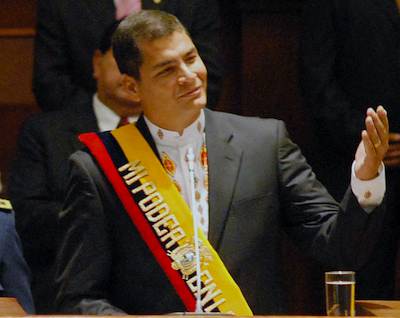- MENU
- HOME
- SEARCH
- WORLD
- MAIN
- AFRICA
- ASIA
- BALKANS
- EUROPE
- LATIN AMERICA
- MIDDLE EAST
- United Kingdom
- United States
- Argentina
- Australia
- Austria
- Benelux
- Brazil
- Canada
- China
- France
- Germany
- Greece
- Hungary
- India
- Indonesia
- Ireland
- Israel
- Italy
- Japan
- Korea
- Mexico
- New Zealand
- Pakistan
- Philippines
- Poland
- Russia
- South Africa
- Spain
- Taiwan
- Turkey
- USA
- BUSINESS
- WEALTH
- STOCKS
- TECH
- HEALTH
- LIFESTYLE
- ENTERTAINMENT
- SPORTS
- RSS
- iHaveNet.com
by Andres Oppenheimer

Rafael Correa - President of Ecuador
I'm not a great fan of using psychological profiles to explain people's political leanings, but a report on Ecuador's rabidly anti-U.S. President Rafael Correa, which I read during a visit to Colombia last week, left me wondering.
According to an item in Colombia's newsweekly Semana, Correa's father spent three years in a U.S. prison for smuggling Colombian cocaine into the United States, and committed suicide shortly after his release.
I have long been curious about Correa's claims to be an anti-U.S. leftist "revolutionary.'' Correa has lived in the United States, and he received a Ph.D. in economics from the University of Illinois.
DOESN'T ADD UP
How could a Ph.D. in economics make public speeches that scare away domestic and foreign investments, trigger capital flight and make the country poorer? Does he know something the rest of us don't know, or is he just posing as a leftist revolutionary as an excuse to grab absolute powers?
Correa, 46, who will start his second term Monday, campaigned in 2006 as a moderate leftist candidate, vowing to keep his distance from Venezuelan President Hugo Chávez. But he soon followed Chávez's steps, convening a Constitutional Assembly to rewrite Ecuador's Constitution in a way that expands his powers, attacking independent media, cracking down on U.S. oil companies, ordering the expulsion of U.S. anti-narcotics troops and -- actively or tacitly -- allowing Colombian FARC guerrillas to set up bases in Ecuador's territory.
Correa recently broke relations with neighboring Colombia, after a 2008 military raid into a FARC camp in Ecuador's territory seized computer files -- later certified as authentic by an Interpol investigation -- that showed Ecuador's and Venezuela's active support for the FARC.
Now, Correa is vowing to "radicalize this revolution'' in his second term. Opposition politicians say he is veering sharply to the left to grab absolute powers and divert attention from news reports that his brother Fabricio got government contracts worth more than $80 million since the president took office.
Correa's father's story was confirmed by the president himself two years ago, but few outside the country noticed, in part because Correa had not yet come across as a firebrand U.S. critic..
A Reuters news agency report quotes Correa as saying during a weekly radio address from the Andean city of Banos that "When I was 5, my father carried drugs to the United States and was arrested.'' Criticizing harsh U.S. punishments for small-quantity drug smugglers, Correa added that "I lived through this, and these people are not delinquents. They are single mothers or unemployed people who are desperate to feed their families.''
Did that childhood experience turn Correa into a radical anti-American leftist, or do his policies stem from a sincere ideological belief?, I asked several well-known Ecuadoreans.
"It's both,'' former Ecuadorean President Osvaldo Hurtado told me. "On the one hand, Correa is known to react with rancor against people or institutions or countries that he perceives to have caused him pain earlier in his life. On the other hand, he is ideological, and grew up believing in the teachings of the [anti-U.S.] Liberation Theology.''
NOT ALL BAD
My opinion:
Not everything Correa has done as president is bad. To his credit, he has confronted Ecuador's powerful teachers unions, and ordered the country's first-ever teachers' evaluation exams. The tests will result in bonuses for good teachers and layoffs for those who are not qualified.
In addition, Correa has taken on the previously untouchable oil workers union, and other powerful labor groups that were rife with corruption. These are not minor accomplishments for a self-described "socialist'' and "revolutionary'' president.
Still, Correa's authoritarian ways are moving him increasingly closer to Chávez's narcissist-Leninist model. And his economic populism has squandered last year's boom in oil prices, which Ecuador could have used to set the foundations for long-term economic prosperity.
If Correa's radical policies are the result of the psychological impact of his father's tragedy, it would be understandable. Most of us would have been marked for life by such a dramatic childhood experience.
But, as president, Correa should pursue economic policies that don't scare away investments, and he should forget about settling old scores, no matter how justifiable they are in his mind.
WORLD | AFRICA | ASIA | EUROPE | LATIN AMERICA | MIDDLE EAST | UNITED STATES | ECONOMICS | EDUCATION | ENVIRONMENT | FOREIGN POLICY | POLITICS
© Tribune Media Services